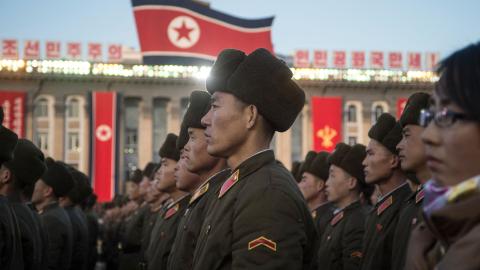Authoritarian governments seized on the pandemic era as an opportunity to deepen their crackdown on human rights. Unsurprisingly, the Kim regime’s tactics were among the most brutal. A new report from the Korean Institute for National Unification (KINU) provides eyewitness testimony that the Kim regime publicly executed violators of Pyongyang’s draconian COVID-19 quarantine measures.
Reports of shoot-to-kill orders for anyone attempting to cross the North Korean border during the pandemic were previously covered by NKNews in October 2020, but new testimony in the KINU report grants further credence to these dark realities.
Public executions have long been a feature of the Kim regime’s policies – ranging from public executions of Christians for being caught with a Bible to the purging of Pyongyang’s elites to tamp down on any semblance of revolutionary spirit. A 2019 report from the Transitional Justice Working Group put a finer point on the matter – of the 600 defectors interviewed, they documented “323 reports of sites of state-sanctioned killings”. According to the same report, 83 percent of North Koreans surveyed said they witnessed a public execution.
While it has always been difficult to get information out of North Korea, the airtight seal the Kim regime placed on the North Korean border during the pandemic made a difficult task next to impossible. Although the Kim regime began loosening COVID border restrictions in 2022, the number of North Korean refugees successfully fleeing to freedom in South Korea dropped precipitously. According to South Korean government statistics, as of September 2023, only 139 North Korean refugees made it to freedom in South Korea last year. That’s up from an all-time low of 63 in 2021 and substantially down from the height of defections in 2009 when almost 3,000 individuals left North Korea in one year.
Emerging revelations about life in North Korea during the pandemic should lead policymakers to probe more deeply into the state of life in North Korea during this time period. There are already fears about food insecurity and restrictions on freedom of movement. The regime’s meticulously implemented border closure alone had the international community concerned that the North Korean people were cut off from the critical lifeline of the once-vibrant informal market economy in the North. Pre-pandemic, it was estimated that 60 percent of North Koreans relied on the informal economy to supplement food supply, for example.
Given the known deteriorations in conditions inside North Korea, the international community should consider next steps to provide support to the North Korean people. For one thing, the U.S. government should consider issuing an atrocity determination for North Korea saying whether the regime has committed or continues to commit crimes against humanity and even genocide. It should also consider extending more expedited forms of refugee relief to North Koreans who desire to resettle in the U.S. rather than in South Korea by extending Priority-2 refugee status. While there has never been any question about the brutality of the Kim regime, these latest report should increase the urgency of responses around the globe to support the North Korean people amidst their suffering.

















